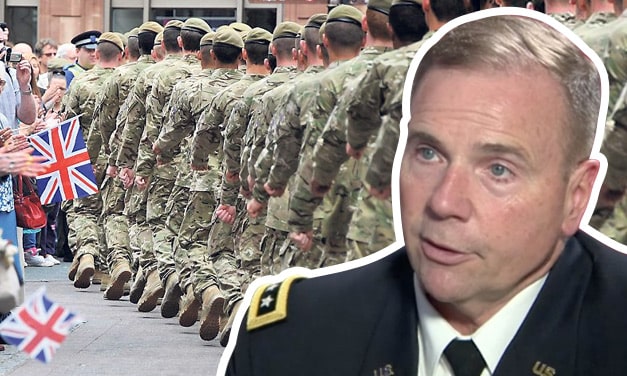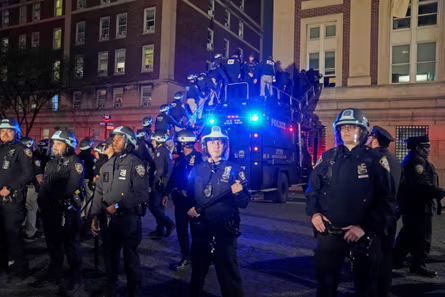A top US general warned that Britain’s shrinking army is “not what it used to be” – as ministers have been urged to get a grip of the nation’s military recruitment crisis.
New analysis revealed the army will have less than 70,000 soldiers within two years – with American and European generals questioning whether the UK is still a top-level fighting force, The Daily Mail reported.
If the army keeps seeing a decline in troops at its current rate, the number of regular soldiers will drop to 67,741 by 2026, according to figures compiled by The Times. This is a smaller number than the United States’ special operations forces alone.
One former senior US general has said that while the UK was still seen as America’s closest ally, it was also seen as “having diminished capabilities over the past couple of decades”.
They added, “Hence, while being the most important ally across the board, it is decidedly not what it used to be, regrettably.”
Based on the current trends, the army will have just 52,000 troops in 10 years.
In a one year period up to September last year, the army’s strength plummeted from 79,139 to 75,983 as more soldiers left than started.
It comes as Grant Shapps announced this month that he is launching an offensive to enlist more women into Britain’s military in a bid to tackle the recruitment crisis plaguing the armed forces.
The Royal Navy is also battling to reverse the sharp drop in the number of people joining, which senior commanders fear could hamper its ability to fight and “damage” the fleet “for years” to come.
Ministers agreed to reduce the army to 72,500 by next year – a choice which has caused anxiety among senior US generals – as the figure could fall even lower than expected.
The army was unable to achieve its recruitment target for soldiers each year for the past 10 years but Capita, the company which oversees recruitment, has been given contracts worth more than £1.1 billion.
It was reported in 2020 that the company was awarded a two-year contract extension with the Ministry of Defence worth £140 million, which began in March 2022.
Tory former armed forces minister Mark Francois said the company should have been fired rather than have its contract renewed, The Times reported.
Shadow Defence Secretary John Healey said, “On current trends, our army is set for further decline if ministers do not get to grips with their recruitment and retention crisis.”
The UK’s military is seeing the effects of decades of cuts and a drop in its war-fighting capability as it deals with a worsening recruitment crisis.
A spokeswoman for the MoD said that British Army tanks were operating in Europe, adding that later this year 20,000 troops would participate in NATO manoeuvres.
The spokeswoman highlighted that the Royal Navy had destroyed drones in the Red Sea and added that the RAF had “weakened” Houthis in the recent airstrikes in Yemen.
She said, “Whilst there are undoubted challenges to military recruitment, people are at the heart of the military and the MoD is taking tangible and concrete steps to address shortfalls. More widely, the UK is spending more than £50 billion on defence this year to protect our interests wherever they are threatened.”
It comes as MailOnline reported the Royal Navy is turning to a “refer-a-friend”-style scheme in a desperate bid to enlist new sailors.
Top armed forces chiefs warned Britain would be “riding its luck” if it failed to get to grips with its military recruitment crisis.
In a bid to turn things around, sailors and Royal Marines are now being offered £500 rewards by the Ministry of Defence for each person they manage to “encourage” to enlist, as part of an internal scheme set to last until March 2025.
The news came amid concerns the globe could soon be plunged into a new world war, with General Sir Richard Barrons, the former Commander of UK Joint Forces Command, fearing the nation would now be ill-equipped for such a conflict.
“This feels, as I imagine, how it would have been in the 1930s before the Second World War,” the retired Army chief told MailOnline, adding, We could just be surprised and done over and that won’t be because we didn’t see the problem coming because we can – it’s on our doorstep.”
“If we are at risk of being pre-conflict rather than post-conflict, then we need to do a better job about deterrence – that’s having a resilient and credible force… At the moment I think we’re riding our luck. That’s a thing that keeps me awake at night,” the retired Army chief added.
Meanwhile, the Defence Secretary said he was worried the make-up of the military did not reflect wider society and insisted more should be done to attract and retain women.
His comments came amid a worsening crisis in the nation’s rapidly shrinking armed forces, with the pace of troops leaving the service outstripping the numbers of new recruits coming into it.
Discussing his plans to tackle the crisis, Shapps previously told the Telegraph, “Something which I’m extremely passionate about is actually having a military which should represent our country as it is today.”
“It can’t be right that our military still only has 11 or 12 percent women, for example, when you make up half the population,” Shapps added.
Women make up just a fraction of Britain’s military, comprising about 11.3 percent of the whole force. Recent figures showed 13.8 percent of all officers in the forces were female. However, there were just 24 women holding top positions.













